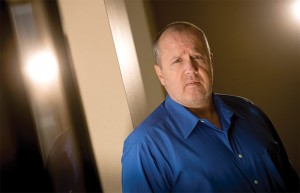Nailing social media: Advice on how to do it well
By: Erika Strebel, [email protected]//January 5, 2016//
Nailing social media: Advice on how to do it well
By: Erika Strebel, [email protected]//January 5, 2016//

The partners in charge of Urban & Taylor S.C. decided about seven years ago to call it quits on updates of the Milwaukee firm’s Facebook and Twitter pages.
Jay Urban, a partner at the personal-injury firm, found in the end that maintaining a Facebook page for the office was of very little benefit.
“You could do light-hearted things,” he said, “but it just didn’t resonate with the Facebook crowd.”
But that doesn’t mean Urban has ceased turning to social media in his attempts to bring in clients.
Now, though, he tends to use his personal Facebook account, which can only be viewed by friends. Urban said he tries to avoid directly promoting the firm or himself as a lawyer.
He instead turns to the social-networking site as a way to drum up referrals. Helping him toward that end are his more than 1,000 friends, who include judges, other lawyers and clients.
Urban said he has found that social media is best used as a means of showing others one’s ethical values and of establishing personal connections. Such connections can be made simply by showing a genuine interest in the lives of his Facebook friends. Some clients come to him after seeing a witty comment he had put up or after reading a post written to take a stance on a particular issue, he said.
“It’s more like sending out information about what belief system you have as a professional, whether you are (for) victim’s right or taking care of the elderly,” Urban said.
New platforms, old rules
 But social media can also prove treacherous in various ways, from creating liability where none had existed before to providing an easy opportunity to break advertising rules set by the Supreme Court.
But social media can also prove treacherous in various ways, from creating liability where none had existed before to providing an easy opportunity to break advertising rules set by the Supreme Court.
The Wisconsin Supreme Court has yet to sanction a lawyer over the improper use of social medial. Other states’ high courts have done so, though, said Dean Dietrich, an ethics expert at the Ruder Ware law firm who frequently represents attorneys in disciplinary cases.
Large law firms and companies usually have guidelines that help lawyers and their colleagues avoid improper uses of social media. Attorneys at smaller places, though, can find that they are on their own when trying to make sure their conduct on social media doesn’t result in a call from the Office of Lawyer Regulation.
Two rules to rule them all
The American Bar Association has no formal guidelines for conduct on social media. And the Supreme Court’s Rules of Professional Conduct make no specific mention of social media; but those rules contain provisions that nonetheless apply.
For lawyers who are dealing with social media, the most important things to keep in mind are protections of attorney-client confidentiality and rules governing the use of advertising, particularly those that prohibit false and misleading statements and testimonials.
In general, attorneys should be careful to avoid misrepresenting facts, misleading people into thinking that an attorney-client relationship has formed and sharing confidential information, said Tim Edwards, a lawyer at Edwards Richter Phillips LLP in Madison.
“What most people don’t think about is that social media is a huge stage of information put in front of an audience that’s constantly changing. You can make a lot of mistakes that are visible to the world,” he said.
Lawyers all too commonly fall into one particular type of pitfall on the websites LinkedIn and Avvo.com, which give clients the ability to leave reviews.
“What happens is we’re so used to being able to type a response right away that lawyers immediately take action to respond and get themselves into a lot of trouble,” Dietrich said.
Letting social media work for you
Douglas Kammer, managing partner at Kammer and Greiber S.C. in Portage, doesn’t use social media at all. He said it poses an unnecessary risk both to his practice and to him personally. For one, he said, social media accounts can be easily hacked.
“It’s so penetrable,” he said. “I’ve got a paralegal who can get into your social media like nothing.”
Also, Kammer said, attorneys can easily lose track of what they are posting online and end up breaking client confidentiality.
That kind of risk, he said, is simply not worth taking, especially when social media are unlikely to generate much business for his practice, which specializes in litigation and real-estate transactions.
Urban, on the other hand, said the security risks outweigh the benefits. He said once-common ways of drumming up clients — such as sending a Christmas card from his firm to an old high school acquaintance — won’t even get him a phone call nowadays.
“It’s not as effective as having a dialogue on Facebook where they can see I am an active person in the community,” he said.
At the same time, Urban said he is careful to make sure he follows ethical rules. For example, he avoids discussing clients or their cases, and never argues about a case on Facebook. Also, when other people use Facebook Messenger to ask for advice, he responds by giving them his office phone number and email so he can talk to them through regular channels and avoid misunderstandings.
The main risk that Urban sees is that his personal posts, especially those that take a stance on some matter, could turn off some clients.
“My concern is: Have I alienated someone who would be a potential client?” he said.
But, surprisingly, he has found his posts about politics to not be as much of a danger as many might think. Urban’s clients, who are CEOs or who work for Republicans, consider it a “breath of fresh air,” he said, and expect him to fight for them in court with just as much passion.
“They say, I want you to stand up for me, I expect you to (argue) like that,” said Urban.

it’s an accurate version,” says Tim Edwards, e-discovery expert at Edwards Richter Phillips
Milwaukee County Circuit Court Judge John DiMotto has found that many lawyers introduce images from social media as evidence — but don’t treat them as such. And it’s a practice that can seemingly be found among all sorts of attorneys, whether they are seasoned or new to the profession.
“I find it fascinating that a number of lawyers seem to have forgotten that rules of evidence apply to social media,” DiMotto said.
For example, in one particular parental-rights case that came before DiMotto, a lawyer offered a printed copy of a page taken from Facebook page of the father in the dispute. The page showed him flashing a $100 bill and could have been damning, but it was never properly authenticated. Much to DiMotto’s surprise, though, the other side did not object.
“A lot of lawyers seem to think that well, it’s a Facebook page, it’s got his photo,” he said, “But it’s so easy to share things, to Photoshop things.”
Similarly, Tim Edwards, an expert in e-discovery at Edwards Richter Phillips LLP, said lawyers are being unwise when they do not authenticate evidence gleaned from social media.
“Social media is electronic data,” said Edwards. “It’s information that is contained in a computer on a particular application that you cannot just pull out of the computer and say it’s an accurate version.”
The easiest way to authenticate Facebook accounts or posts is, during cross-examination, to ask the person who supposedly created them whether the page is really theirs. Chances are, Dimotto said, the person won’t deny it. But if the person does not own up to the page, Edwards said, the lawyer may not be able to have the evidence admitted.
“Social media can be powerful evidence,” DiMotto said, “but both sides have to be vigilant.”
— Erika Strebel
Legal News
- Former Wisconsin college chancellor fired over porn career is fighting to keep his faculty post
- Pecker says he pledged to be Trump campaign’s ‘eyes and ears’ during 2016 race
- A conservative quest to limit diversity programs gains momentum in states
- Wisconsin prison inmate pleads not guilty to killing cellmate
- Waukesha man sentenced to 30 years for Sex Trafficking
- 12-year-old shot in Milwaukee Wednesday with ‘serious injuries’
- Milwaukee man convicted of laundering proceeds of business email compromise fraud schemes
- Giuliani, Meadows among 18 indicted in Arizona fake electors case
- Some State Bar diversity participants walk away from program
- Wisconsin court issues arrest warrant ‘in error’ for Minocqua Brewing owner
- Iranian nationals charged cyber campaign targeting U.S. Companies
- Facing mostly white juries, are Milwaukee County defendants of color truly judged by their peers?
WLJ People
- Power 30 Personal Injury Attorneys – Russell Nicolet
- Power 30 Personal Injury Attorneys – Benjamin Nicolet
- Power 30 Personal Injury Attorneys – Dustin T. Woehl
- Power 30 Personal Injury Attorneys – Katherine Metzger
- Power 30 Personal Injury Attorneys – Joseph Ryan
- Power 30 Personal Injury Attorneys – James M. Ryan
- Power 30 Personal Injury Attorneys – Dana Wachs
- Power 30 Personal Injury Attorneys – Mark L. Thomsen
- Power 30 Personal Injury Attorneys – Matthew Lein
- Power 30 Personal Injury Attorneys – Jeffrey A. Pitman
- Power 30 Personal Injury Attorneys – William Pemberton
- Power 30 Personal Injury Attorneys – Howard S. Sicula











